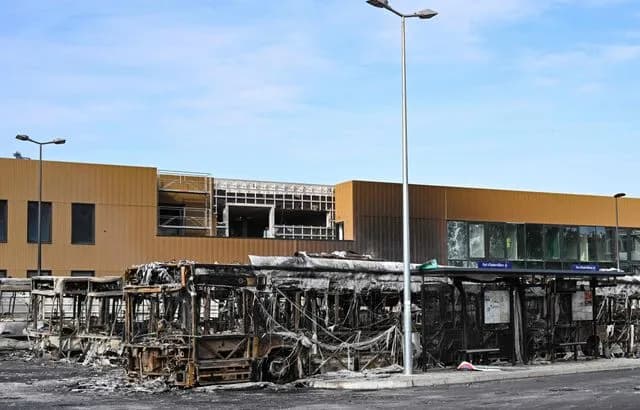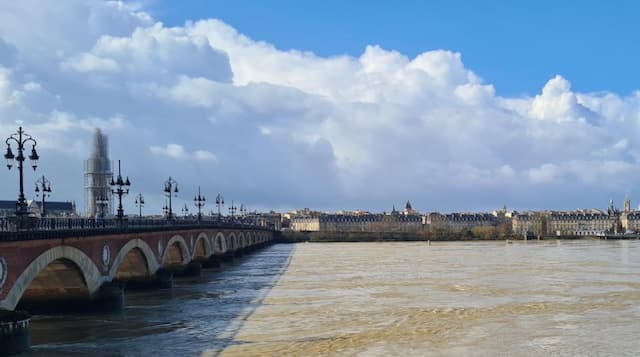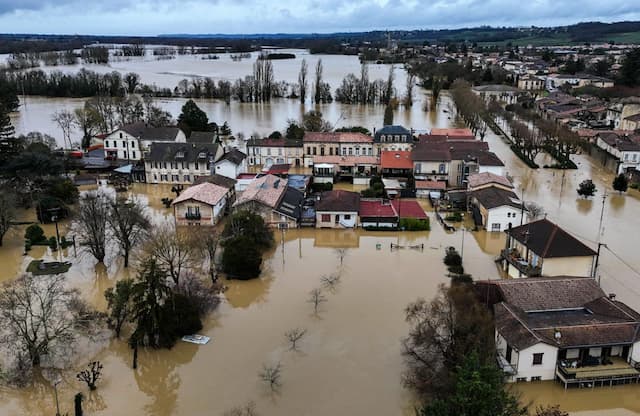Riots in France: Buses and Trams Stopped in the Evening in Several Cities

END OF SERVICE: Due to the violence after Nahel’s death, the Minister of the Interior ordered the interruption of buses and trams from 9 p.m.
Users of public transport, you will have to make your arrangements to return home tonight. The French Ministry of the Interior ordered this Friday the prefects to interrupt buses and trams throughout the territory from 9 p.m., in order to limit the spread of the riots which also target transport infrastructure.
This measure announced by Minister Gérald Darmanin comes after three nights of riots with burned buildings, looted stores and buses and trams attacked by bands of rioters all over France.
Twelve buses burned in Ile-de-France
In Ile-de-France, even before this announcement, Ile-de-France Mobilités (IDFM) had announced the end of bus and tram services at 9 p.m. every evening “until further notice”, as was already the case on Thursday. The metro will close at the same times as on weekdays, around 1 a.m. Friday and Saturday, an hour earlier than usual.
“We want public service to resume (…) but we will always put the safety of agents and passengers first”, summed up Friday morning the Minister Delegate for Transport Clément Beaune, while visiting a site of the RATP attacked with blows. of Molotov cocktails the day before in Aubervilliers (Seine-Saint-Denis).
Result: twelve buses totally burned and a thirteenth partially damaged. “The buses are used every day by suburban residents (…) it is a popular transport structure”, lamented the boss of the RATP Jean Castex in front of the charred carcasses.
Transport closed from 7 p.m. in Marseille, 7:30 p.m. in Metz
Elsewhere in Ile-de-France, 18 buses were burned in Provins (Seine-et-Marne) and, in total, Ile-de-France Mobilités counted around thirty vehicles destroyed. Decisions to close transport networks were taken all over France throughout the day. In Marseille, the entire network will be shut down from 7 p.m., including the metro.
From the middle of the afternoon, Bordeaux, Grenoble or Pau announced the end of the bus and tram service at 9 p.m. In Saint-Étienne, “due to the multiple incivilities that occurred last night”, the closure was announced for 8 p.m. and even 7:30 p.m. in Metz, “due to the call from political organizations to demonstrate in the city centre at 8 p.m. “, According to Mayor François Grosdidier (LR). Ditto in Lille, where nothing will circulate, with the exception of the metro, from 8 p.m.
On the Toulouse side, trams, buses and cable cars are closed from 9 p.m. On line A, “stations between Arènes and Basso Cambo close at 9 p.m.”. On line B, “closure of Empalot and Trois Cocus stations”. On both lines, the last departures from the terminals will take place at 11:30 p.m. In Auvergne-Rhône-Alpes, the Cars Region lines will also be closed “exceptionally” from 7:30 p.m. except in Allier, Ardèche, Cantal and Haute-Loire.
The decision “socially unfair”
This unusual interruption of public transport services due to the riots raises some questions. Several Ile-de-France trade union federations ( CFDT, CGT, Unsa, FSU and Solidaires) condemned in a press release the decision to stop buses and trams, deemed “socially unjust and totally contrary to the obligation of continuity of service audience “.
Among the RATP unions, on the other hand, some are calling for even more drastic measures. “We must also close the rail network (metro and RER)”, claimed Jean-Christophe Delprat, RATP manager at FO-Transports. “We believe that the measures are not sufficient because there is such a climate of violence that we cannot afford to leave metro drivers, station agents who are often women who work alone, without security,” he added.
The RATP, which operates the metro and lines A and B of the RER, is content for the moment to close the stations where the riots are the most violent, such as in Nanterre-Préfecture, not far from where a policeman killed the young Nahel on Tuesday.
For Arole Lamasse, secretary general of Unsa -RATP, the measures are going “in the right direction”, but “it would be necessary that in the areas identified as the most dangerous, the buses should be stopped from 5 p.m.”.
The trade unionist also says he has asked for control operations in transport to cease so that “employees are mobilized for information and guidance of travellers”.
Enjoyed this? Get the week’s top France stories
One email every Sunday. Unsubscribe anytime.


